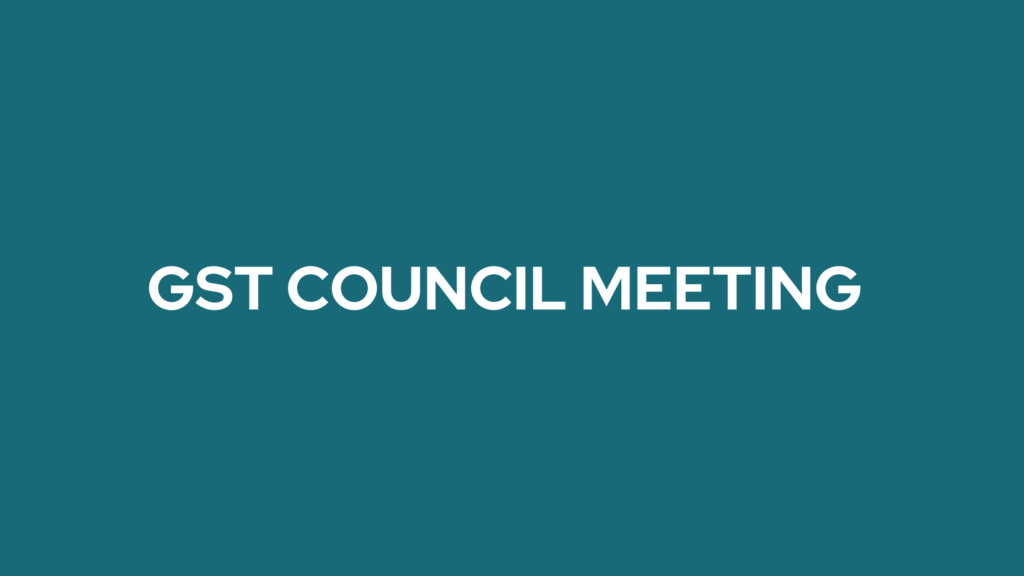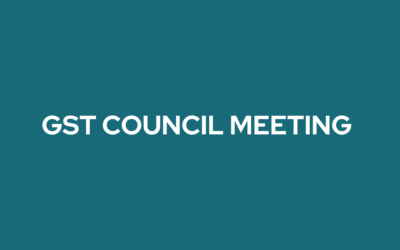14th GST Council Meeting – Highlights and Updates
The 14th Goods and Services Tax (GST) Council Meeting, chaired by the Union Minister of Finance Shri Arun Jaitley, was held at Srinagar, Jammu and Kashmir on 18th may 2017. On day 1 of the said council meeting following are the main and important decisions were made.
Find below 14th GST Council Meeting – Details and Information
Approval given to 7 sets of drafts: The GST Council has given its approval to 7 sets of Draft Rules dealing with Registration, Payment, Refund, Invoice, Debit & Credit Note, Input Tax Credit,Valuation and Composition.
While two Draft GST rules on Transition provisions and Returns have been sent for legal vetting.
Approval to GST tax rates for certain goods and tax fitment of remaining items and services would be decided on the 2nd day of the meeting: The GST Council has approved the GST rates for 1205 items of goods out of 1211 items at nil rate, 5%, 12%, 18% and 28% to be levied on certain goods, with essential items of daily use being kept in the lowest bracket of 5%. A decision on the tax rate for remaining 6 categories of items, including Gold, Bidis, Textile, Footwear, Agricultural implements and Packaged/Branded food items, along with tax fitment for categories of services was kept in abeyance and was supposed to be taken up for discussion on the 2nd day of 14th GST council meeting.
GST Rate Schedule for goods will be subject to further vetting during which the list may undergo some changes though it has been uploaded immediately after the GST Council’s decision.
However below is the GST Rate Schedule for Goods as decided by the GST Council for easy understanding.
- Nil Rate (0%): No tax will be imposed on items like fresh meat, fish, chicken, eggs, milk, buttermilk, curd, natural honey, fresh fruits and vegetables, flour, besan, bread, prasad, salt, bindi, Sindoor, stamps, judicial papers, printed books, newspapers, bangles, handloom etc.
- 5% Rate: Items such as fish fillet, cream, skimmed milk powder, branded paneer, frozen vegetables, coffee (except instant coffee), tea, spices, pizza bread, rusk, sabudana, kerosene, coal (tax under the existing system is 11.69%), medicines, stent, lifeboats will attract tax of 5%.
- 12% Rate: Frozen meat products , butter, cheese, ghee, dry fruits in packaged form, animal fat, sausage, fruit juices, Bhujia, namkeen, Ayurvedic medicines, tooth powder, agarbatti, colouring books, picture books, umbrella, sewing machine, and cellphones will be taxable at 12%.
- 18% Rate: Most of the items will fall 18% tax slab which include flavoured refined sugar, pasta, cornflakes, pastries and cakes, preserved vegetables, jams, sauces, soups, ice cream, instant food mixes, mineral water, tissues, envelopes, tampons, note books, steel products, printed circuits, camera, speakers and monitors etc.
- 28% Rate: Chewing gum, molasses, chocolate not containing cocoa, waffles and wafers coated with chocolate, pan masala, aerated water, paint, deodorants, shaving creams, after shave, hair shampoo, dye, sunscreen, wallpaper, ceramic tiles, water heater, dishwasher, weighing machine, washing machine, ATM, vending machines, vacuum cleaners, shavers, hair clippers, automobiles, motorcycles, aircraft for personal use, and yachts etc.will attract the highest rate of tax i.e. 28%.
The Council had broadly approved the rates of GST Compensation Cess to be levied on certain goods such as Pan Masala, Aerated water, Tobacco and Tobacco Product, Cigarettes, Motor Vehicles etc.
- A cess of 204% has been proposed for pan masala containing tobacco ‘Gutkha’, cigarettes not exceeding 65 mm will attract a cess of 5% plus rs. 1,591 per thousand
- Small petrol cars with an engine capacity of less than 1200 cc will attract 1% cess, and those with a diesel engine capacity of less than 1500 cc will attract 3% cess. Large cars with an engine capacity greater than 1500 cc, and SUVs with a length of more than 4 m and engine capacity greater than 1500 cc, will attract a cess of 15%. Motorcycles with an engine capacity of more than 350 cc will attract 3% cess and an equal amount of levy will be applied on aircraft for personal use and yachts and other vessels for pleasure or sports.
The list of services that will be under reverse charge had been approved by the GST Council such as goods transport agency services, services by an individual advocate or firm of advocates by way of legal services, directly or indirectly, services by a director of a company or a body corporate, import of services, radio taxi or passenger transport services provided through electronic commerce operator etc.
In this regard Mr. Jaitley has commented that “Most of the work related to rollout of GST has been completed. Only a few things remain. In goods category, six categories are still to be decided. The residuary rules will be put up for public comments and they need to be approved. We will also be looking at the presentation of the state of preparedness of the GSTN.” All these series of events are going to enlighten the pave for rolling out of the biggest indirect tax reform from July 1, 2017.

